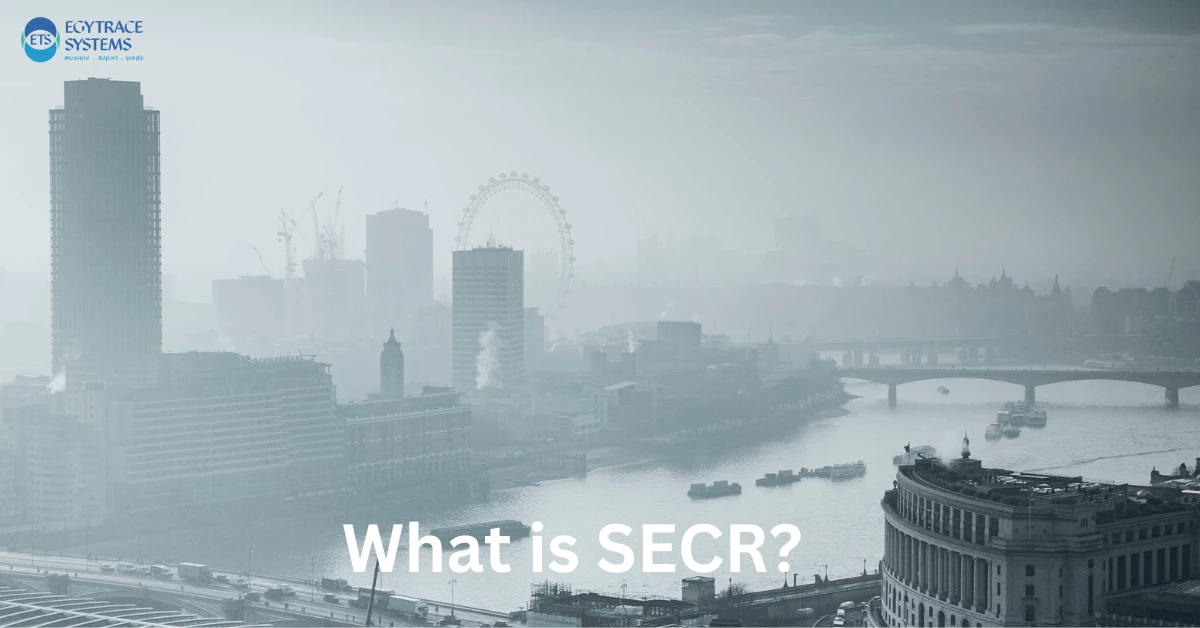What is SECR Reporting?
Streamlined Energy and Carbon Reporting (SECR) is a pivotal framework in the U.K., created to promote transparency in energy consumption and carbon emissions among businesses. SECR plays a significant role in encouraging companies to adopt energy-efficient practices, ultimately contributing to global climate action by reducing energy usage and greenhouse gas (GHG) emissions.
The implementation of SECR represents a major step in the U.K.’s commitment to environmental responsibility. As a front-runner in GHG emissions accounting and reporting, the U.K. sets a powerful example for other nations. This guide will explore the key elements of SECR, the businesses required to report, and why it is essential for U.K. companies to comply.
Why Was SECR Introduced?
The primary objective of SECR is to boost transparency regarding the energy use and carbon emissions of businesses in the U.K. By encouraging organizations to disclose this vital data, SECR helps improve energy efficiency, supports sustainability efforts, and empowers stakeholders to make informed decisions. This openness also promotes better energy management, which contributes to both national and global environmental targets.
Furthermore, SECR was crafted to streamline the reporting process, reducing the administrative burden on businesses while improving the quality and comparability of the data reported. It is part of the U.K. government’s broader strategy to align with the recommendations from the Task Force on Climate-related Financial Disclosures (TCFD), ensuring that climate-related reporting is more cohesive and effective.
Aslo read: A Guide to Measuring Your Carbon Footprint
Who Needs to Report Under SECR?
SECR applies to various organizations, focusing mainly on larger entities that are more likely to have a substantial environmental footprint. The following groups are required to report:
- Quoted Companies: Publicly listed firms on major stock exchanges, including the London Stock Exchange, NASDAQ, and the New York Stock Exchange.
- Large Unquoted Companies: U.K.-incorporated, unlisted companies meeting significant financial thresholds.
- Limited Liability Partnerships (LLPs): Large LLPs are also subject to SECR reporting.
To be considered a “large” company under SECR, an organization must meet at least two of these criteria:
- A turnover of £36 million or more.
- A balance sheet of £18 million or more.
- At least 250 employees.
Certain organizations are exempt from SECR, such as small energy users, public bodies, and those incorporated outside the U.K. However, even exempt companies are encouraged to voluntarily participate in sustainability initiatives.
What Are the SECR Reporting Requirements?
SECR outlines specific reporting guidelines regarding energy use and carbon emissions. Companies must disclose:
- Energy Use: Total energy consumption, including gas, electricity, and transportation fuels.
- GHG Emissions: Total carbon emissions (CO2e) from the company’s operations.
- Methodology: The approach used to calculate energy consumption and GHG emissions.
- Intensity Ratio: A ratio comparing emissions with a relevant business metric, such as revenue or production volume.
- Energy Efficiency Efforts: Steps taken to improve energy efficiency during the reporting period.
- Historical Data: Comparisons with energy use and emissions from previous years.
For complex organizations, the report must cover various operational boundaries, including:
- Financial Control Boundary: Reporting all environmental impacts under the company’s financial control.
- Operational Control Boundary: Reporting impacts under the company’s operational control.
- Equity Share Boundary: Reporting based on the company’s equity share in operations.
Why SECR Compliance is Crucial for U.K. Businesses
Adhering to SECR offers more than just legal compliance. It has strategic advantages for businesses. By showcasing transparency, SECR helps companies build a reputation for environmental responsibility. As sustainability becomes a critical factor for consumers and investors alike, SECR-compliant businesses are likely to gain a competitive edge.
Moreover, improving energy efficiency and reducing carbon emissions through SECR can result in significant cost savings over time. Businesses that take proactive steps toward energy reduction may see lower operational expenses and enhanced productivity.
SECR also aligns with the U.K.’s broader environmental objectives, contributing to global efforts to achieve climate goals. For businesses, complying with SECR supports both national and international sustainability initiatives.
How to Enhance SECR Reporting and Compliance
To improve SECR reporting, companies can take several steps to ensure their disclosures are accurate, comprehensive, and timely:
- Staff Training: Educating staff on SECR’s importance and their role in gathering data will simplify the reporting process.
- Energy Measurement Tools: Implementing advanced systems to track and analyze energy usage and emissions can help businesses collect precise data.
- Voluntary Actions: Companies can voluntarily report additional sustainability information or set ambitious emissions reduction targets.
Conclusion
In summary, SECR is a significant step forward in the U.K.’s sustainability reporting, driving energy efficiency and carbon emissions reductions across industries. The transparency and accountability promoted by SECR help businesses improve their environmental impact while benefiting from cost savings and a stronger public image. As businesses continue to prioritize sustainability, understanding and adhering to SECR’s guidelines will be key to long-term success.
At EgyTrace, we specialize in supporting businesses with advanced digital solutions to meet sustainability goals. Our automated MRV system ensures compliance with EU Carbon Tax regulations, making it easier for companies to navigate the complexities of environmental reporting. Let us help you enhance your sustainability journey and align with global environmental standards.

